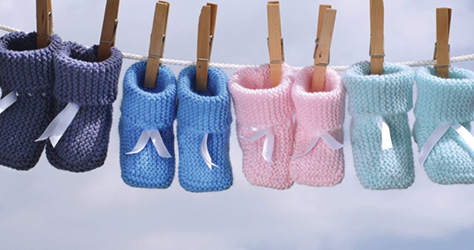So you've found out you're expecting 4 or more...
Most multiple pregnancies are pretty uneventful and produce gorgeous, healthy babies - but things probably will feel a touch different! Here’s the low-down.
At a glance
- The UK sees just a handful of higher order births every year, so you’re in a very special position!
- You'll find out at your first ultrasound scan, how many babies you are carrying
- Antenatal classes are especially important in multiple pregnancy, so book early

Finding out
The news that you are expecting four babies or more will probably come as a HUGE surprise. You may feel delighted, scared and shell-shocked all at once! But the good news is there’s plenty of support available from the NHS and specialist organisations like Twins and Multiple Birth Association (Tamba).
Who has multiples?
The UK sees just a handful of higher order births every year, so you’re in a very special position!
Ante-natal care
You’ll get the lowdown at your first ultrasound scan, finding out how many foetuses you’re carrying, how many placentas there are and whether they’re in separate or shared amniotic sacs. It may help to see a picture of your babies at the first ultrasound – helping the news to sink in!
You might want to ask about the hospital procedures for multiple births, special arrangements for antenatal care, and whether the hospital has a midwife who specialises in breastfeeding support for mothers of multiples.
Antenatal classes are especially important in multiple pregnancy, so book early to make sure you complete them long before the babies are due, just in case they’re a bit early.
Looking after yourself
It’s probably no surprise to hear you’ll gain more weight than women carrying a ‘singleton’. That’s because you’re carrying extra babies, placentas, amniotic fluid and body fluid. It’s definitely time to demand that seat on the train!
Common symptoms
You’re bound to have more aches, pains and discomforts than usual because of the sheer scale of the task you are accomplishing! Higher hormone levels might also mean you suffer more morning sickness – do seek advice if you’re being sick three times a day for three days.
Complications
You might get automatically placed in a ‘high-risk’ category, but don’t worry - most women carrying twins, triplets or more have uneventful pregnancies and healthy babies.
Some conditions are more common in multiple pregnancies though, so keep an eye out for anaemia, pre-eclampsia, gestational diabetes and vaginal bleeding.
Your babies may arrive a few weeks early so if you think you’re having contractions, do seek help fast to slow things down.
And babies can be a bit smaller when you’re having a few, but you’ll be offered regular ultrasound scans to monitor their growth.
Get prepared
You’re going to be super busy when your gorgeous babies finally arrive, plunging you into a new stratosphere of happy chaos. So read up beforehand on everything from multiple births to sleep routines. And why not get down to your local twins club to meet mums with twins, triplets or more to meet mums in the same boat?
When to finish work
Quads are pretty physically demanding, so it’s a good idea to stop work around 28 to 30 weeks and rest for a few weeks. Just make sure you give your employer notice early enough.
The government is keen to help new mums, so make sure you find out what your maternity rights are.